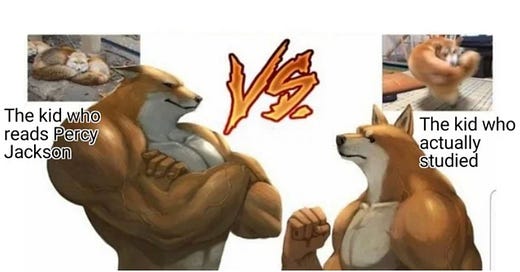Literature and Media
FANDOM
Fandom: The fans of a particular person, team, or fictional series. Basically, a community consisting of fans of a specific subject.
E.g. The Harry Potter fandom
Fandom Rivalry: Two fandoms that are at odds with each other, typically due to believing one fandom is better than the other. Fans of one fandom are expected to hate fans of the other, and vice versa.
https://tvtropes.org/pmwiki/pmwiki.php/Main/FandomRivalry
Toxic Fandom: A fandom with a large segment of fans that engage in negative behaviors, even going far enough to send threats to people associated with the particular show/book/team/etc.
https://www.verywellmind.com/what-is-toxic-fandom-5214499#:~:text=Toxic%20fandom%20is%20a%20buzzword,are%20considered%20negative%20and%20unacceptable.
5. Have you ever read a book or watched a movie that you really love but some people you know despise, or vice versa?
Most of my friends dislike the animes I watch and the books I read. But it really isn’t anything serious.
6. Are you a part of a fanbase, or fandom, of any book, movie, series, or game? What do you usually discuss with other members of your fandom?
I am a hardcore fan of many animes, games, movies, tv shows, and books alike. One of my favorite fandoms has got to be the Riordernverse Fandom. I don’t really interact much on fandoms but I do appreciate reading people’s opinions on a particular topic and occasionally scrolling through some fanarts or memes.
7. Sometimes, fans of movies, TV shows, or games with similar genres, concepts, or themes can create fandom rivalries. Moreover, there can also be conflicts among people belonging to the same fandom, most notably among fans of Star Wars, Doctor Who, or the Japanese anime series My Hero Academia. (see WatchMojo’s list of top 10 fandom rivalries). Some fandoms have been described by journalists as ‘toxic fandoms’. What makes a fandom toxic? In fact, it is unlikely that all members of a fandom engage in ‘toxic’ behaviors; many fans are positive, polite, and supportive. If so, is the use of the term ‘toxic’ justified?
I’ll admit. I am not a hardcore fan of Star Wars and Doctor Who, mostly because they both came out when I was young and not at all interested in the Internet (Except Roblox which doesn’t really count I suppose). However, I am a fan of the Japanese anime series My Hero Academia, so I feel rather obliged to share my thoughts on the fandom. I haven’t really interacted much in the fandom, but I have seen some controversy. Supposedly, the fandom has been engaged in the topic of the main protagonist’s love interest. Some have even sent death threats to the author regarding that topic. Of the very limited time I spend on the fandom, I have seen tons of arguments that negatively impact the fandom, with the MHA fandom being one of the top most toxic fandoms as of today. I, for one, am proud to not be a part of any online community regarding MHA. (No offense to all the other non-controversial fans out there).
What makes a fandom toxic, you ask? I believe a toxic fandom is a fandom that has a large number of people who engage in constant inappropriate and negative behavior. These behaviors can range from being blatantly rude to the other fans to something very serious like doxing (leaking someone’s information). Although there are many innocent fans who care more about appreciating the work, a fandom with too much consistent controversy automatically gives it a bad reputation. Whether a fandom is toxic or not can be subjective at times, but I still firmly believe the term “toxic” to be justified, especially when a large number of people think the same.
8. Is it the responsibility of the authors and creators of books, movies, or TV shows to manage their fandoms to prevent negative behaviors? If so, what can they do?
No matter what the creators do, they can never completely prevent negative behavior in the fandom. One thing they can do, however, is to confirm frequently-asked controversial questions, which will give naysayers more of a reason to back off and the other fans more of a reason to ignore the topic. Most controversies start when two sides of the fandom want to prove something about the character/fandom that may have a huge impact on the story as a whole.





